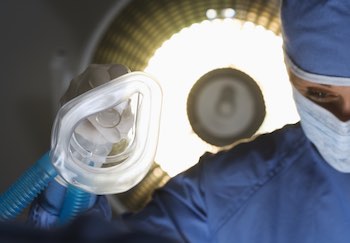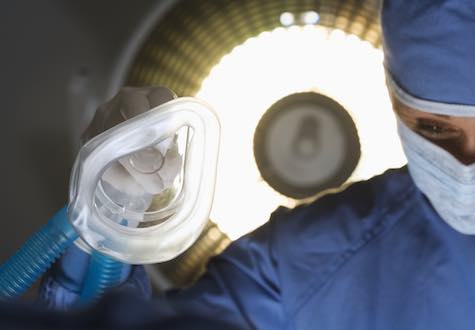
Feeling uneasy when it comes to going under anesthesia? If you have an upcoming surgery, you’ll most likely be sedated to help you stay comfortable and pain-free during the procedure. For some people, the thought of losing consciousness can feel very scary. Learning the facts can help.
What You Should Know About Anesthesia
The medical establishment divides anesthesia into four different types:
- General anesthesia, used for major operations, causes loss of consciousness during the procedure.
- IV/monitored sedation, often used for minimally invasive surgery, makes you drowsy but still able to talk.
- Regional anesthesia, such as an epidural or a nerve block, numbs a large part of the body while you remain conscious.
- Local anesthesia numbs just the small affected area of minor procedures, such as getting stitches or a mole removed.
How Long Does Anesthesia Last?
Recovery depends on the surgery and patient, but your anesthesiologist can help with pain management after the initial anesthesia wears off. The timeline varies:
- IV pain medication can help for up to 8 hours.
- Nerve blocks can help manage pain for 12 hours.
- Spinal blocks can alleviate pain for 24-48 hours.
- Epidurals are the longest lasting, easing pain for up to 4-5 days.
Normal Fears & Side Effects of Anesthesia
Before surgery, you may have some pre-surgery anxiety.
Hunger
Why do you fast before surgery? If you eat, the content in your stomach can get into your lungs if you aspirate (breathe vomit into the airways) while under anesthesia. Anesthesiologist William Manson, MD, stresses that this situation can be life-threatening.
Nervousness
If your nerves are getting the best of you, tell your anesthesiologist when they meet with you before surgery. Anesthesiologist Yiyu Zhao, MD, explains: “If there are no medical issues, we’re happy to give you some sedating or relaxing medication before you go back to the operating room.”
Anesthesiologists Are Doctors, Too
Anesthesiologists are highly trained physicians specializing in this particular field. They receive the same amount of education as other doctors. Their training includes four years of anesthesiology residency, as well as additional fellowship training in certain subspecialties.
Anesthesia Risks
All surgeries have a certain amount of risk. There is a rare possibility of being partially awake during the operation with general anesthesia, but your anesthesiologist should recognize this quickly and increase the anesthetic dose.
Epidurals can cause a dramatic drop in your blood pressure and, in rare cases, permanent damage. There’s a potential for nerve damage with a nerve block as well, but with the help of ultrasound, this risk is minimal.
As these situations are rare, most people are more likely to be affected by common complications of anesthesia, such as nausea and vomiting or itching.
Recovering from Anesthesia
Nausea After Surgery
Once you wake up, you might feel nausea as a side effect of the medicine. Feeling nausea is more common in non-smokers, females and people who suffer from motion sickness. Anesthesiologist Karen Singh, MD, shares that everyone will receive an anti-nausea medication during surgery. If you have a history of feeling sick afterwards, let your anesthesiologist know before surgery so they can give you additional medication.
Soreness and Eye Issues
Other post-surgery side effects include a sore throat or lips from the breathing tube you’ll need for general anesthesia.
If your eyes feel a little funny, don’t be alarmed. Your anesthesiologist will tape your eyes closed during surgery to prevent an injury, although this is very uncommon.
Mental Fuzz
It’s normal to feel groggy from the medication. For elderly patients, it might take longer to recover mentally, with the possibility of confusion and disorientation. However, anesthesiologists try to minimize this risk with careful selection and dosing of medications.
Anesthesia Myths vs. Facts
1. I can have hard candy, gum or smoke before surgery.
Myth. Zhao discourages patients from smoking, enjoying a piece of hard candy or gum. You may not be ingesting anything significant, but the act of chewing or sucking can stimulate your gut to produce acid. When you’re under general anesthesia, it could increase your risk of aspiration during the procedure.
Manson reminds patients to only take the fluids or medications your doctor recommends before surgery.
Upcoming Surgery?
If you’re preparing for an upcoming surgery at UVA, learn what you can expect during your hospital stay.
2. Smokers may require a deeper anesthesia than non-smokers.
Fact. Singh explains that smokers tend to cough more, which can cause issues with a breathing tube. Therefore, smokers will need more anesthesia or muscle relaxants before the procedure to limit the amount of coughing.
3. Herbal or other dietary supplements won’t affect my anesthesia.
Myth. Zhao expresses concern for certain herbal or dietary supplements, because some can thin your blood. If you took herbal medications before the procedure, let your anesthesiologist know in advance. In addition, herbal teas or supplements can cause abnormal heath rhythms and organ damage, which can affect your anesthetic plan and management.
4. My anesthesiologist will leave the operating room once the surgery begins.
Myth. Your anesthesiologist will stay with you for the entire procedure to supervise your vital signs and breathing and to make sure you’re receiving the right dose of anesthesia during the surgery.
5. My child’s anesthesia will be administered differently than an adult’s.
Fact. To make it easier for the little ones, children receive anesthesia through a gas mask first, before the insertion of an IV. The anesthesiologist may sing to them to help distract or calm them down before they lose consciousness.
